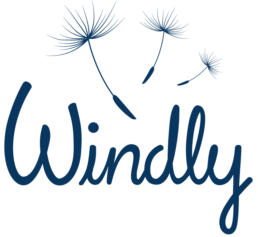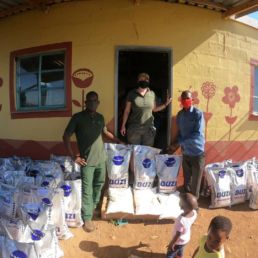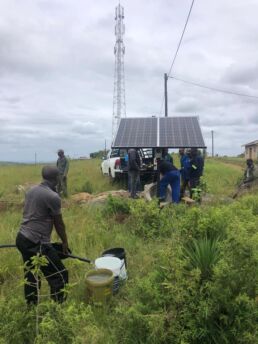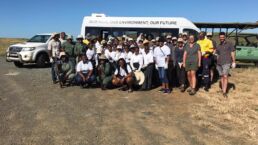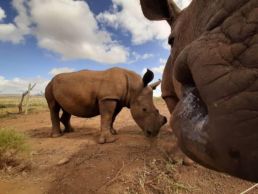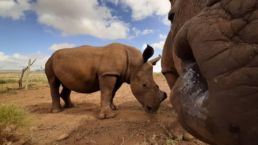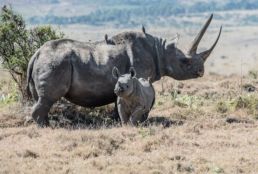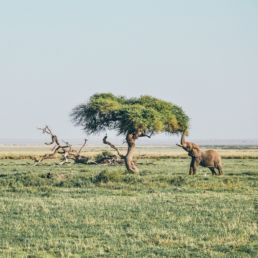Zululand Conservation Trust
Zululand Conservation Trust
Passionately preserving, protecting and nurturing the land and its wonderful wildlife for future generations.

Zululand, South Africa
About this project
Our mission at the Zululand Conservation Trust is a commitment to the conservation of endangered species whilst maintaining and supporting partnerships with neighbouring communities. The Trust was established in 2011 to achieve a common dream between a group of devoted wildlife enthusiasts. Based in northern Zululand, we recognise the fundamental need to involve, empower, educate and support local communities, in order to achieve effective and lasting conservation.
"The Zululand Conservation Trust has a small team with small overheads, and so when you donate money towards our projects you can be guaranteed that 100% of those funds are going straight back into conservation and community. We work closely with a reserve surrounded by local communities which we have built long term relationships with, and so community funding is helping the extended conservation family surrounding a protected area". - Frances Hannah
Uthingo Foundation
Uthingo Foundation
To enable communities and wildlife in Southern Africa to coexist with reduced/no conflict by means of empowerment, education and investment.
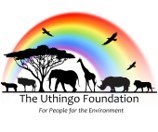
Zululand, South Africa
About Uthingo Foundation
The Uthingo Foundation, is a charitable foundation dedicated to advancing the connectivity and understanding of the public in the conservation, protection and improvement of the physical and natural environment of wilderness areas in Southern Africa. With the dedication of our volunteers, and partners, we strive to provide structured education, sports and empowerment programmes to create a positive attitude towards wildlife and its conservation.
What achievement are you most proud of for your organisation?"Definitely installing the borehole to Emabhokisini Village – from the community having to take on a steep hill to transport dirty, infested water they shared with livestock to now having access to fresh, clean water, improving their livelihoods, health and wellbeing. It was our first project and we were so proud to have completed it with the support and work of the local community". - Marumo Nene
Zululand Rhino Orphanage
Zululand Rhino Orphanage
Passionately preserving, protecting and nurturing the land and its wonderful wildlife for future generations.

Zululand, South Africa
About this project
Our mission at the Zululand Conservation Trust is a commitment to the conservation of endangered species whilst maintaining and supporting partnerships with neighbouring communities. The Trust was established in 2011 to achieve a common dream between a group of devoted wildlife enthusiasts. Based in northern Zululand, we recognise the fundamental need to involve, empower, educate and support local communities, in order to achieve effective and lasting conservation.
"The Zululand Conservation Trust has a small team with small overheads, and so when you donate money towards our projects you can be guaranteed that 100% of those funds are going straight back into conservation and community. We work closely with a reserve surrounded by local communities which we have built long term relationships with, and so community funding is helping the extended conservation family surrounding a protected area". - Frances Hannah
Practice Project Page
Zululand Rhino Orphanage
Passionately preserving, protecting and nurturing the land and its wonderful wildlife for future generations.

Zululand Region
About this project
Our mission at the Zululand Conservation Trust is a commitment to the conservation of endangered species whilst maintaining and supporting partnerships with neighbouring communities. The Trust was established in 2011 to achieve a common dream between a group of devoted wildlife enthusiasts. Based in northern Zululand, we recognise the fundamental need to involve, empower, educate and support local communities, in order to achieve effective and lasting conservation.
“For us, conservation is more than just a passion or a calling. It is a way of life.We have made our home in the heart of the beautiful Zululand region. Here, we are dedicated to sustaining the land, conserving endangered species as well as uplifting local communities through partnerships, projects and programmes.”
“For us, conservation is more than just a passion or a calling. It is a way of life.We have made our home in the heart of the beautiful Zululand region. Here, we are dedicated to sustaining the land, conserving endangered species as well as uplifting local communities through partnerships, projects and programmes.”
Windly Conversations
Template page
Zululand Rhino Orphanage
Passionately preserving, protecting and nurturing the land and its wonderful wildlife for future generations.

Zululand Region
About this project
Our mission at the Zululand Conservation Trust is a commitment to the conservation of endangered species whilst maintaining and supporting partnerships with neighbouring communities. The Trust was established in 2011 to achieve a common dream between a group of devoted wildlife enthusiasts. Based in northern Zululand, we recognise the fundamental need to involve, empower, educate and support local communities, in order to achieve effective and lasting conservation.
The Zululand Conservation Trust has a small team with small overheads, and so when you donate money towards our projects you can be guaranteed that 100% of those funds are going straight back into conservation and community. We work closely with a reserve surrounded by local communities which we have built long term relationships with, and so community funding is helping the extended conservation family surrounding a protected area. - Frances Hannah
The Zululand Conservation Trust has a small team with small overheads, and so when you donate money towards our projects you can be guaranteed that 100% of those funds are going straight back into conservation and community. We work closely with a reserve surrounded by local communities which we have built long term relationships with, and so community funding is helping the extended conservation family surrounding a protected area. - Frances Hannah
Windly Conversations
Wildlife Loss
Wildlife Loss
Wildlife is worth more alive than dead.
This is the core message, central to the efforts to protect the world’s most vulnerable animals, people and natural spaces. What this message eludes to is the complexity of wildlife conservation, which not only includes research, monitoring, management of wildlife and ecology, and ecotourism programs, but also efforts like:
- Mitigating human wildlife conflict – such an elephant eating your crops right before a harvest that will support your family’s school fees
- Reducing food insecurity – desperate times call for desperate measures. Families that are food insecure are more likely to poach for subsistence (food for their table) and to be lured into organized poaching rings for big game like rhino horn or ivory.
- Reducing inequality – imagine living right outside a game reserve where people visit from around the world, paying thousands of dollars to stay at a luxury reserve, while you’ve never seen an elephant in the wild. How can we expect people to protect something they’ve never experienced?
- Education – from formal schools to bush education to adult training centers, wildlife conservation is about community upliftment and providing opportunities for rural communities who otherwise would have few.
- Infrastructure and Services – increased presence from tourism or research means more traffic to an area. This typically prompts investments in things like roads, electricity, water pumps, and more. It’s vital to include communities in all stages of proposed development.
- Balancing maintaining cultural traditions with conservation – working with communities means understanding cultural heritage, including traditional medicines and rituals and working with leaders to find middle ground solutions to practices that may hard vulnerable wildlife.
What does all of this lead to? A wildlife economy.
An economy where wildlife is worth more alive than dead. An economy that is diversified, low risk, locally sustained, and locally controlled.
Some statistics:
- There are approximately 6,000 African wild dogs (painted dogs) left in the wild and the species is considered endangered.
- With one rhino poached every 10 hours and, rhinos are a critically endangered species.
- An estimated 100 African elephants are poached every day.
- Giraffes are now on the endangered species list.
Wildlife and wild spaces need to be protected, not just because they have a natural right to be here just as much as humans do, but also because they are necessary for ecological balance and the health of our world, and in turn, the health of our economies and other human systems.
“But perhaps the most important lesson I learned is that there are no walls between humans and the elephants except those that we put up ourselves, and that until we allow not only elephants, but all living creatures their place in the sun, we can never be whole ourselves.”
-Lawrence Anthony
Wildlife Conservation
Support those on the Front Lines of Wildlife Conservation
The COVID-19 crisis has increased risks to already vulnerable wildlife conservation efforts.
With tourism shutdown across most of Southern Africa for the foreseeable future, staff are laid off, anti-poaching units underfunded, and most research and management have come to a screeching halt. Many of these activities are funded through ecotourism revenues, conservation levies, and general donations.
With little traffic through these areas, poaching, both organized crime for rhino horn and ivory, and subsistence poaching for bush meat has increased. There is a distinct need for increased presence of anti-poaching units (APUs), feeding schemes to reduce desperation in villages surrounding wildlife areas, and to keep research and management efforts going.
The COVID-19 crisis shows the interconnection of the issues we work on, such as wildlife conservation, food security, and forced migration. We’ll be sharing more about this on our blog in the coming weeks.
Your support will make a difference for Africa’s wildlife, wild spaces, and rural communities. It is vital that communities see value in wildlife alive more than dead.
The following is a list of organizations that were doing amazing work pre-COVID-19 and need our help to continue their work.
In the meantime, please consider supporting these organizations:
Project Rhino – This multifaceted organization is involved in many aspects of conservation and rural community support. From anti-poaching units, to RhinoArt programs for rural youth, to food security, they do it all and are a very strong organization.
Click here for more information on Project Rhino.
Click here to support general Project Rhino efforts.
Click here to learn more and watch a video about their specific COVID-19 Campaign.
Zululand Conservation Trust – In addition to their regular conservation work, this exceptional organization is also providing COVID-19 relief meals to rural communities surrounding wild spaces, helping to prevent desperation, which leads to increased poaching.
Click here for more information on the Zululand Conservation Trust.
Click here to support the Zululand Conservation Trust.
WildlifeACT – WildlifeACT’s unique business model fills a gap between a wildlife reserve’s capacity for management and research and the need that exists. They run voluntourism programs and student programs to finance ongoing research and management in several reserves in Southern Africa. They have particularly exciting wild dog and vulture programs, but do everything from community food support to wildlife tracking and monitoring. As their main revenue source relies on tourism and open borders, their ongoing management and research programs are massively constrained.
For more information on WildlifeACT, click here.
For their specific COVID-19 plan and campaign, click here.
Zululand Rhino Orphanage – Sadly, the need for rhino orphanages is only likely to increase during and after the COVID-19 crisis. Rhino poaching is one of the most horrendous and barbaric exploits of humankind. This terrible reality makes the need for this organization absolutely dire, as it fights to save the traumatized orphans of a critically endangered species.
For more information about the Zululand Rhino Orphanage, click here.
